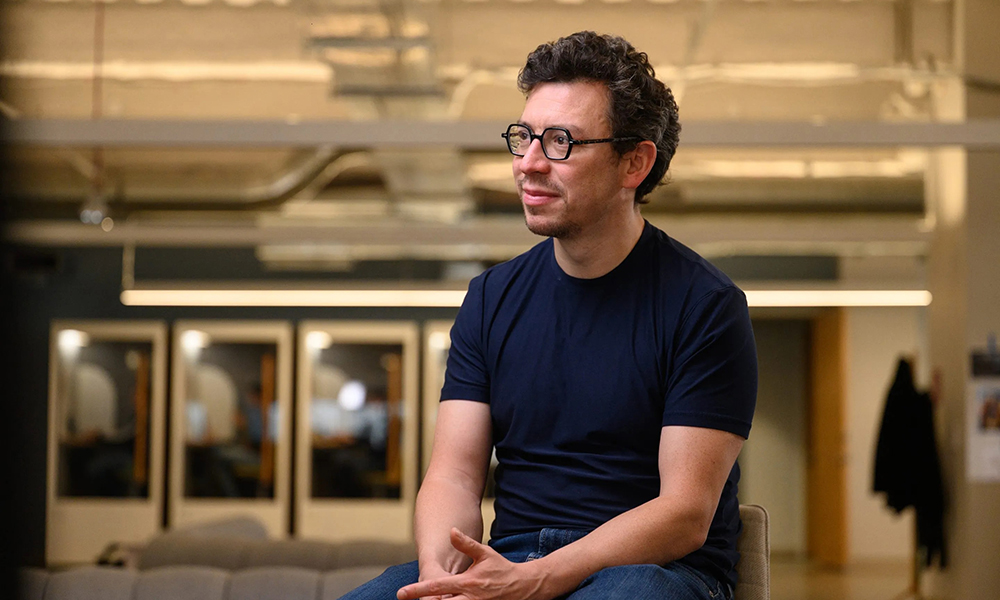
4月28日,多鄰國(guó)(Duolingo)聯(lián)合創(chuàng)始人兼首席執(zhí)行官路易斯·馮·安在LinkedIn上發(fā)布了一封他剛剛發(fā)給公司全體員工的郵件,。他在信中闡述了將這款語(yǔ)言學(xué)習(xí)應(yīng)用打造成“人工智能優(yōu)先”組織的愿景,,具體措施包括:若人工智能能夠勝任承包商的工作,則逐步淘汰承包商,;以及只有當(dāng)團(tuán)隊(duì)無(wú)法通過(guò)人工智能實(shí)現(xiàn)工作自動(dòng)化時(shí)才被允許招聘新人,。
外界的反應(yīng)迅速而猛烈。一位評(píng)論者寫(xiě)道:“這簡(jiǎn)直是場(chǎng)災(zāi)難,。我要取消訂閱了,。”另一位評(píng)論者寫(xiě)道:“人工智能優(yōu)先意味著人類(lèi)被排在了最后,?!钡谌辉u(píng)論者則道出了批評(píng)者的普遍心聲:“我無(wú)法支持一家用人工智能取代人類(lèi)的公司?!?/p>
一周后,,馮·安收回了最初的言論,澄清說(shuō)他并不認(rèn)為“人工智能會(huì)取代員工的工作”,,而是將人工智能視為“在保持或提高工作質(zhì)量的前提下提升工作效率的工具,。”
在新近的一次采訪(fǎng)中,,馮·安坦言,,外界如此強(qiáng)烈的反彈令他震驚。他最近對(duì)《金融時(shí)報(bào)》表示:“我完全沒(méi)有料到會(huì)有這么大的反彈,?!彼硎荆m然自己本應(yīng)更清晰地闡述其人工智能目標(biāo),,但他也認(rèn)為,,這種負(fù)面情緒源于人們對(duì)于人工智能將取代人類(lèi)員工的普遍擔(dān)憂(yōu)。他表示:“每家科技公司都在做類(lèi)似的事情,,[但]我們公開(kāi)進(jìn)行了表態(tài),。”
不過(guò),,有此遭遇的并非只有馮·安一人,。其他首席執(zhí)行官們也曾直言不諱地談?wù)撍麄兊娜斯ぶ悄鼙ж?fù)將如何影響人類(lèi)員工。例如,,Klarna首席執(zhí)行官在去年8月就表示,,得益于人工智能,,公司已削減了數(shù)百個(gè)崗位。上個(gè)月,,他又補(bǔ)充道,,這項(xiàng)新技術(shù)已幫助公司將其員工規(guī)模縮減了40%,。
然而,,員工們對(duì)于自己可能被人工智能取代的潛在風(fēng)險(xiǎn)深感焦慮。根據(jù)《財(cái)富》雜志委托哈里斯(Harris)進(jìn)行的民意調(diào)查,,2023年,,熟悉ChatGPT的員工中約有40%擔(dān)心將被該技術(shù)所取代。而皮尤研究中心(Pew)今年早些時(shí)候的一項(xiàng)研究發(fā)現(xiàn),,約32%的員工擔(dān)心人工智能會(huì)減少他們的工作機(jī)會(huì),。另有52%的人則擔(dān)心人工智能未來(lái)可能對(duì)職場(chǎng)帶來(lái)的潛在影響。
人工智能公司的領(lǐng)導(dǎo)者們自身也未必會(huì)向這些憂(yōu)心忡忡的員工提供安慰,。Anthropic公司的首席執(zhí)行官達(dá)里奧·阿莫代上個(gè)月對(duì)Axios表示,,在未來(lái)五年內(nèi),人工智能可能會(huì)取代約一半的初級(jí)工作崗位,。他認(rèn)為,,現(xiàn)在已無(wú)回頭路可走。
他表示:“這聽(tīng)起來(lái)很瘋狂,,人們不愿意不相信,。作為這項(xiàng)技術(shù)的創(chuàng)造者,我們有責(zé)任和義務(wù)如實(shí)說(shuō)明即將發(fā)生的一切,?!保ㄘ?cái)富中文網(wǎng))
譯者:劉進(jìn)龍
審校:汪皓
4月28日,多鄰國(guó)(Duolingo)聯(lián)合創(chuàng)始人兼首席執(zhí)行官路易斯·馮·安在LinkedIn上發(fā)布了一封他剛剛發(fā)給公司全體員工的郵件,。他在信中闡述了將這款語(yǔ)言學(xué)習(xí)應(yīng)用打造成“人工智能優(yōu)先”組織的愿景,,具體措施包括:若人工智能能夠勝任承包商的工作,則逐步淘汰承包商,;以及只有當(dāng)團(tuán)隊(duì)無(wú)法通過(guò)人工智能實(shí)現(xiàn)工作自動(dòng)化時(shí)才被允許招聘新人,。
外界的反應(yīng)迅速而猛烈,。一位評(píng)論者寫(xiě)道:“這簡(jiǎn)直是場(chǎng)災(zāi)難,。我要取消訂閱了?!绷硪晃辉u(píng)論者寫(xiě)道:“人工智能優(yōu)先意味著人類(lèi)被排在了最后,。”第三位評(píng)論者則道出了批評(píng)者的普遍心聲:“我無(wú)法支持一家用人工智能取代人類(lèi)的公司,?!?/p>
一周后,,馮·安收回了最初的言論,澄清說(shuō)他并不認(rèn)為“人工智能會(huì)取代員工的工作”,,而是將人工智能視為“在保持或提高工作質(zhì)量的前提下提升工作效率的工具,。”
在新近的一次采訪(fǎng)中,,馮·安坦言,,外界如此強(qiáng)烈的反彈令他震驚。他最近對(duì)《金融時(shí)報(bào)》表示:“我完全沒(méi)有料到會(huì)有這么大的反彈,?!彼硎荆m然自己本應(yīng)更清晰地闡述其人工智能目標(biāo),,但他也認(rèn)為,,這種負(fù)面情緒源于人們對(duì)于人工智能將取代人類(lèi)員工的普遍擔(dān)憂(yōu)。他表示:“每家科技公司都在做類(lèi)似的事情,,[但]我們公開(kāi)進(jìn)行了表態(tài),。”
不過(guò),,有此遭遇的并非只有馮·安一人,。其他首席執(zhí)行官們也曾直言不諱地談?wù)撍麄兊娜斯ぶ悄鼙ж?fù)將如何影響人類(lèi)員工。例如,,Klarna首席執(zhí)行官在去年8月就表示,,得益于人工智能,公司已削減了數(shù)百個(gè)崗位,。上個(gè)月,,他又補(bǔ)充道,這項(xiàng)新技術(shù)已幫助公司將其員工規(guī)??s減了40%,。
然而,員工們對(duì)于自己可能被人工智能取代的潛在風(fēng)險(xiǎn)深感焦慮,。根據(jù)《財(cái)富》雜志委托哈里斯(Harris)進(jìn)行的民意調(diào)查,,2023年,熟悉ChatGPT的員工中約有40%擔(dān)心將被該技術(shù)所取代,。而皮尤研究中心(Pew)今年早些時(shí)候的一項(xiàng)研究發(fā)現(xiàn),,約32%的員工擔(dān)心人工智能會(huì)減少他們的工作機(jī)會(huì)。另有52%的人則擔(dān)心人工智能未來(lái)可能對(duì)職場(chǎng)帶來(lái)的潛在影響,。
人工智能公司的領(lǐng)導(dǎo)者們自身也未必會(huì)向這些憂(yōu)心忡忡的員工提供安慰,。Anthropic公司的首席執(zhí)行官達(dá)里奧·阿莫代上個(gè)月對(duì)Axios表示,在未來(lái)五年內(nèi),人工智能可能會(huì)取代約一半的初級(jí)工作崗位,。他認(rèn)為,,現(xiàn)在已無(wú)回頭路可走。
他表示:“這聽(tīng)起來(lái)很瘋狂,,人們不愿意不相信,。作為這項(xiàng)技術(shù)的創(chuàng)造者,我們有責(zé)任和義務(wù)如實(shí)說(shuō)明即將發(fā)生的一切,?!保ㄘ?cái)富中文網(wǎng))
譯者:劉進(jìn)龍
審校:汪皓
On April 28, Duolingo cofounder and CEO Luis von Ahn posted an email on LinkedIn that he had just sent to all employees at his company. In it, he outlined his vision for the language-learning app to become an “AI-first” organization, including phasing out contractors if AI could do their work, and giving a team the ability to hire a new person only if they were not able to automate their work through AI.
The response was swift and scathing. “This is a disaster. I will cancel my subscription,” wrote one commenter. “AI first means people last,” wrote another. And a third summed up the general feeling of critics when they wrote: “I can’t support a company that replaces humans with AI.”
A week later, von Ahn walked back his initial statements, clarifying that he does not “see AI replacing what our employees do” but instead views it as a “tool to accelerate what we do, at the same or better level of quality.”
In a new interview, von Ahn says that he was shocked by the backlash he received. “I did not expect the amount of blowback,” he recently told the Financial Times. While he says he should have been more clear about his AI goals, he also feels that the negativity stems from a general fear that AI will replace workers. “Every tech company is doing similar things, [but] we were open about it,” he said.
Von Ahn, however, isn’t alone. Other CEOs have also been forthright about how their AI aspirations will affect their human workforce. The CEO of Klarna, for example, said in August of last year that the company had cut hundreds of jobs thanks to AI. Last month, he added that the new tech had helped the company shrink its workforce by 40%.
Anxiety for workers around the potential that they will be replaced by AI, however, is high. Around 40% of workers familiar with ChatGPT in 2023 were worried that the technology would replace them, according to a Harris poll done on behalf of Fortune. And a Pew study from earlier this year found that around 32% of workers fear AI will lead to fewer opportunities for them. Another 52% were worried about how AI could potentially impact the workplace in the future.
The leaders of AI companies themselves aren’t necessarily offering words of comfort to these worried workers. The Anthropic CEO, Dario Amodei, told Axios last month that AI could eliminate approximately half of all entry-level jobs within the next five years. He argued that there’s no turning back now.
“It sounds crazy, and people just don’t believe it,” he said. “We, as the producers of this technology, have a duty and an obligation to be honest about what is coming.”






